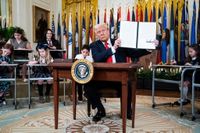On March 21, 2025, a coalition of former journalists and advocacy organizations filed a legal complaint in the US District Court for the Southern District of New York, seeking to restore employees of the Voice of America (VOA) dismissed as a result of President Donald Trump’s Executive Order 14238. The order, which was enacted less than a week prior on March 14, aimed to eliminate seven federal entities, including the US Agency for Global Media (USAGM), the umbrella organization of which VOA is a part.
The legal filing argues for the reinstatement of nearly 1,300 staff members who were abruptly placed on administrative leave following the controversial executive order, an event that has since been dubbed "Bloody Saturday" among affected employees. This drastic measure came after an article published on the same day of the order accused VOA of disseminating what was described as "radical propaganda" and promised to halt taxpayer funding for such content.
Among the plaintiffs are former VOA correspondents and notable organizations such as Reporters Sans Frontieres (RSF) and the American Federation of Government Employees (AFGE). They aim to challenge what they term as an unlawful interference by the Trump Administration, which they argue violates the legal protections that ensure the professional independence and integrity of VOA and related media entities. In their complaint, they cite a potential breach of 22 USC § 6204(b) and the Administrative Procedure Act (APA), underscoring the claim that governmental actions were arbitrarily executed without due process.
Historically, VOA has served as a critical voice, reporting on issues relevant to U.S. interests from a distinctly American perspective. Its faithfulness to broadcasting the truth, even when that truth has been less than favorable to the United States, has marked its path since its inception. Coverage of the Vietnam War and the swelling movements in Tiananmen Square during the 1989 protests highlights this commitment. During those tumultuous times, as protesters in Beijing were generating grassroots movements, they turned to outlets like VOA and the BBC for credible information, contrasting sharply with the state-controlled narratives offered by their own government.
Kurt Achin, a former VOA correspondent, emphasized the organization's commitment to truth, stating, "VOA tells the truth and does not embody the views of any single sector of American life." This statement encapsulates the ethos that has sustained VOA’s credibility over decades, acknowledging both triumphs and failings while embracing its role as a globally recognized news source. However, the credibility and operation of VOA have come under intense scrutiny in the current political climate.
In a further twist of irony, Steve Herman, VOA’s former chief national correspondent, was recently suspended for remarks made regarding the Trump administration’s staffing choices. He stated that “loyalty” had emerged as a more critical attribute than “experience” for appointments in Trump’s Cabinet. Such actions signal broader concerns about censorship and political control that have plagued media organizations under the current administration.
The backdrop to this legal challenge is notable for its timing and the implications it carries for press freedom in the United States. Advocates for press rights fear that these executive measures could pave the way for harsher censorship under the guise of organizational reform. As RSF Executive Director Clayton Weimers articulated, “It’s clear that Donald Trump’s action will encourage harsher crackdowns against journalists and press freedom, putting VOA and RSF staff, correspondents, volunteers, and supporters in greater danger.”
The complaint details the groundbreaking implications of losing voice, stating that prior to March 15, 2025, Congress mandated that VOA continuously broadcast to the world—a standard upheld for over eighty years. The abrupt changes, according to the plaintiffs, signify an unprecedented failure to honor this mandate, threatening the integrity of a voice that has historically withstood the challenges posed by authoritarian regimes.
As proceedings unfold in court, the coalition of former VOA staff and advocacy organizations continue to seek not only the restoration of their own jobs but the reinstatement of vital journalistic integrity within the U.S. government’s broadcasting framework. Their bid seeks to compel USAGM and its leaders to not only follow the law but also to restore programming and maintain the networks ensuring balanced reporting.
The courts are now called upon to evaluate these claims, and once again, they will be tasked with adjudicating the fraught relationship between state and media that has historically defined the U.S. journalistic landscape. There is a longing among those who have served at VOA, like Donald Kirk, who have borne witness to both the power of truth-telling and the vulnerabilities it entails in turbulent political environments.
As this unfolding saga reveals the potential clash between governmental authority and journalistic independence, one can only hope that the lessons of the past will guide the outcome. The fate of the Voice of America, an institution symbolizing the very ideals of democracy and transparency, hangs in the balance, reflective of broader societal challenges to free expression and a fair media landscape.






